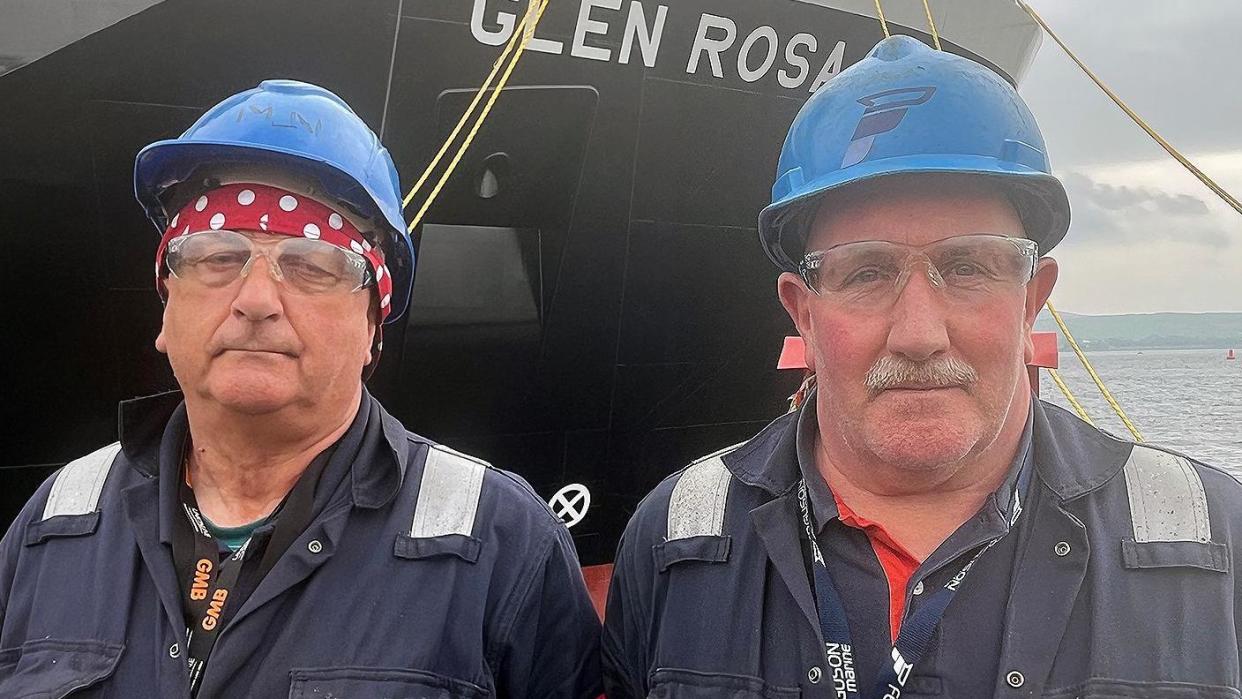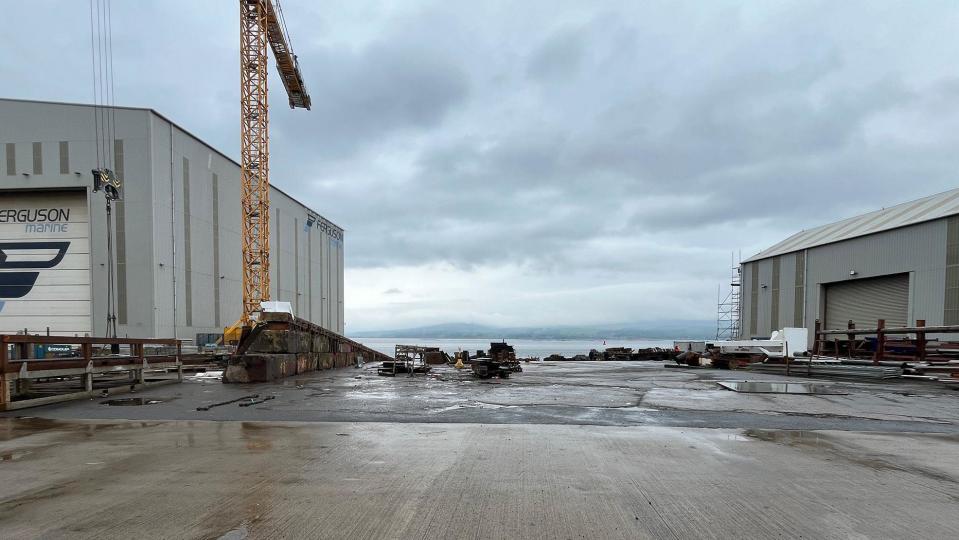'Time running out' plea over shipyard's future

- Oops!Something went wrong.Please try again later.
Workers at Ferguson shipyard have warned that time is running out to give the yard a future as it looks to move on from the ferries controversy.
GMB union representatives said work on Glen Sannox and Glen Rosa was tapering off and the Port Glasgow yard was now in desperate need of new orders.
They said the workforce was not to blame for design and past management mistakes that led to huge cost overruns and delays in building the CalMac ships.
The warning came as new Economy Secretary Kate Forbes attended a cross-party summit on how best to support the nationalised shipyard.
The shipyard is hoping to be given the contract to build seven small all-electric ferries for CalMac, similar to vessels it has built on-time and on-budget in the past.
Speaking to BBC News after the summit at Greenock Town Hall, Ms Forbes said she wanted to see the boats built in Scotland, though this was subject to procurement laws.
She said there was a future for the yard and that she wanted to listen to unions and understand what the opportunities were.
"Ultimately we want to see a good outcome for taxpayers, a good outcome for the workers of the yard - but a good outcome for islanders and as a government we need to balance all those issues to ensure that whatever decision we make is in the best interest of the country," she said.
With the yard still working to improve productivity, unions are calling for the contract to be directly awarded rather than put out to competitive tender.
GMB shop stewards John McMunagle and Alex Logan argue the extra costs of building the ferries in Scotland are more than offset by economic benefits in the local community, which has lost 1,200 jobs in the past 18 months.
"Coming on the back of the things that's happened in Inverclyde - EE jobs going, Amazon jobs going, the polythene factory jobs going - we can't afford to lose this," said Mr McMunagle.
"If we lost this [shipyard], this area is finished.
"I think it is time to start sounding alarm bells. Time is running out."
The Scottish government has said it wants to support the yard but has warned there are strictly limited circumstances where a direct award is possible.

Ferguson Marine is also waiting for a decision on new investment which would help it compete for future contracts in the open market.
A request for £25m for a new steel cutting line and software was turned down last November, but ministers are currently examining a revised proposal.
Half of the 10 large vessels in the current CalMac fleet are Ferguson-built ships, many of them operating well beyond their expected service life.
But a 2015 contract for Glen Sannox and Glen Rosa - the first liquefied natural gas (LNG) powered ferries ever built in the UK - went badly wrong, with the ships more than six years late and at least four times over budget.
Glen Sannox is due to be handed over later this year, with much of the remaining work involving specialist outside contractors dealing with the LNG systems.
Lessons learned from the first ship have been applied to the build of Glen Rosa, which has progressed rapidly over the past year.
The ship was successfully launched from the slipway last month in a far more complete state than Glen Sannox was at its launch in 2017.
Glen Rosa still requires a year of fitting out at the quayside, but the work of the steelworkers is largely complete.
"What we’re doing now is utilising the workforce – but they’re not working at their chosen trades," explained Mr McMunagle.
"They’re working as labourers or maintaining the yard."
The shops stewards said they had great sympathy for islanders who had been affected by the delays, and they recently had a positive meeting with a ferry users group on Arran.
But they said the past mistakes were not the fault of the workforce, who have often been praised for the quality of their welding and fabrication work.
Many of the extra costs and delays have arisen because work has had to be repeatedly re-done because of design mistakes or other changes.
"There’s not been proper drawings, proper plans put in place, proper management," said Alex Logan.
"We need someone to have a bit of faith in us. We know the workforce can do it. It's just got to be properly managed and properly planned."
The cross-party summit on the future of Ferguson's was hosted by the GMB
Deputy First Minister Kate Forbes, who represented the government, had previous involvement with Ferguson's in her former role as finance secretary.
BBC News understands she was instrumental in the departure of Tim Hair, the £2,500 a day "turnaround director" who left Ferguson's in 2022 after the workforce had threatened a vote of no-confidence in him and his management team.
Inverclyde Council leader Stephen McCabe, local MSP Stuart McMillan, Ferguson's interim chief executive John Petticrew and MSPs from the Scottish Conservatives and Scottish Labour also attended.
Mr McCabe said the area could not afford the yard to close.
"It was a positive meeting but I'm not counting my chickens because tough decisions need to be made and they need to be made in a matter of weeks, not months," he said.

